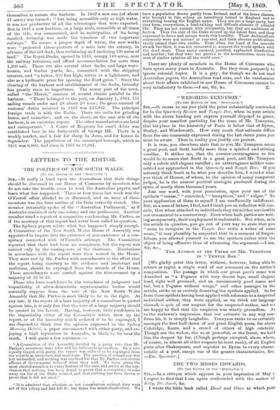THE POLITICS OF NEW SOUTH WALES.
[TO THE EDITOR OF THE "SPECTATOR.")
SIR,—It really is hard upon the Australians that their doings should be discussed in our House of Commons by members who do not take the trouble even to read the Australian papers, and
learn what has happened. Three or four times last week was the O'Farrell affair alluded to or discussed, and on none of these occasions was the bare outline of the facts correctly stated. One member invariably spoke of the "Australian Parliament," as if Australia contained only one colony and one parliament. Another member cited a report of a committee condemning Mr. Parkes, as if the accuracy of that report had never been called in question.
The Sydney papers relate what has happened simply enough. A Committee of the New South Wales House of Assembly was appointed to inquire into the existence or non-existence of a con
spiracy connected with O'Farrell's attempt. The Committee reported that there had been no conspiracy, but the report was carried only by the casting-vote of the chairman. Resolutions in accordance with the report were then moved in the House. They were met by Mr. Parkes with amendments to the effect that the report being contrary to the evidence and irrelevant and malicious, should be expunged from the records of the House. These amendments were carried against the Government by a majority of 32 to 22.
Those who have confidence in the soundness of judgment and impartiality of ultra-democratic representative bodies would naturally suppose from the vote of the New South Wales Assembly that Mr. Parkes is most likely to be in the right. At any rate, if the report of a bare majority of a committee is quoted against him, it is only fair that the vote of a large majority should be quoted in his favour. Having, however, little confidence in the impartiality either of the Committee which drew up the report, or of the Assembly which ordered it to be expunged, I am disposed to think that the opinion expressed in the Sydney Morning Herald, a paper unconnected with either party, and enjoying a high reputation in Australia, is likely to be near the truth. I will quote a few sentences :—
"A Committee of tho Assembly decided by a party vote that Mr. Parkea's assertions were false and his inferences groundless. By a vote equally tinged with party, the report was ordered to be expunged from tho records as irrelevant and malicious. The question of conspiracy was loft undecided, and nothing was resolved but that Mr. Parkes and certain eaters of Government believed what they said. We have given the most careful attention to every feature of the case, and arrive at the conclusion that nothing has been found to prove that a conspiracy to take away the life of the Duke existed, and that nothing has been shown to prove that it did not exist." have a population drawn partly from Ireland, and of the lower classes, who brought to this colony an hereditary hatred to England and to everything bearing the English name. They are not a large party, but they form, everywhere, a loud-talking and difficult element of colonial life. They are not content with citizenship, but they are ambitions of faction. Thus the visit of the Duke stirred up the latent tires, and they expressed in fierce and savage words this hostility. Their declamations commonly were not noticed or repeated, and their obscure publications rarely passed their own circles. Thus, when the hand of the assassin struck the blow, it was not unnatural to connect the words spoken with the deed done. Thus many excused, justified, applauded disaffection and murder ; but they were not parties to the assassination, more than men of similar opinions all the world over."
There are plenty of members in the House of Commons who have spent many years in Australia. But they seem purposely to ignore colonial topics. It is a pity; for though we do not read Australian papers, the Australians read ours, and the carelessness about their affairs exhibited in our House of Commons cannot be very satisfactory to them.—I am, Sir, &c. Z.






























 Previous page
Previous page